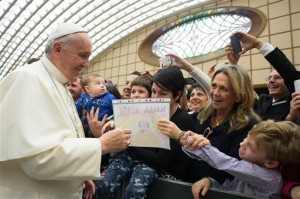
In this picture made available by the Vatican newspaper L’ Osservatore Romano, Pope Francis is presented by a child with a drawing depicting a Pope’s portrait and a writing which reads Merry Christmas, during an audience with the Holy See’s employees in the Paul VI hall at the Vatican, Monday, Dec. 22, 2014. AP
VATICAN CITY, Holy See — Pope Francis will offer his annual Christmas blessing on Thursday, traditionally an occasion to appeal for remedies to the world’s woes.
In his second “urbi et orbi” (to the city and the world) message, the popular Argentinian pontiff will address the globe’s 1.2 billion Catholics and millions of others tuning in from around the planet.
The plight of Christians and other religious minorities suffering persecution in the Middle East, notably at the hands of the jihadist Islamic State (IS) group, is expected to rank high among his concerns, along with the war in Syria and the conflict between Israel and the Palestinians.
In Africa he will no doubt focus on the campaign of violence led by Islamic fundamentalists in northeastern Nigeria as well as largely forgotten conflicts elsewhere on the continent and the thousands of lives lost in the Ebola epidemic.
The 78-year-old pontiff may also appeal to the warring sides in the Ukraine conflict to turn away from violence.
Other likely themes include the hordes of migrants fleeing persecution or seeking a better life who are prey to unscrupulous human traffickers.
The pope, who will next year publish an eagerly awaited encyclical on environmental issues and the preservation of “creation,” may also touch on global warming and natural disasters.
The speech is generally fairly brief and Francis — who has been known to extemporise on many occasions – is thought likely to stick to the prepared text.
He has put an end to a longstanding tradition of popes wishing a happy Christmas in dozens of languages.
Celebrating Christmas Eve mass late Wednesday, Francis urged people to have greater empathy towards family and friends with problems, saying the world “needs tenderness” and warmth.
“Do we have the courage to welcome with tenderness the difficulties and problems of those who are near to us?” he asked.
“Or do we prefer impersonal solutions, perhaps effective but devoid of the warmth of the Gospel? How much the world needs tenderness today!” he said.
In the Middle East, Christmas festivities will be tinged with sadness following a year of bloodshed marked by a surge in the persecution of Christians that has drawn international condemnation.
– Displaced Christians –
Francis delivered a Christmas message via telephone to refugees displaced to Iraq’s Kurdish autonomous region.
In Baghdad, Chaldean Patriarch Louis Sako said about 150,000 Christians had been displaced by an offensive spearheaded by IS, which has targeted Christians and other minorities, with dozens leaving Iraq each day.
Iraq’s displaced Christians “still live in a tragic situation and there are no quick solutions for them,” Sako told AFP, saying that particularly this Christmas, they needed reassurances that they “are not left alone and not forgotten”.
In Syria, Christians in the war-torn city of Homs were enjoying their first Christmas in three years in the Hamidiyeh neighbourhood, with a brightly coloured tree and a manger made from rubble set up in the middle of the ruins.
Francis sent a video message to South Koreans recalling his trip to the country in August in which he said: “The great celebration in honour of the (Catholic) martyrs (in the 18th and 19th centuries in Korea), and the encounters with young people remain fresh in my memory.”
Cubans prepared to celebrate Christmas, a resurgent holiday banned for 38 years by the communist government, with an early gift from US President Barack Obama: a historic rapprochement.